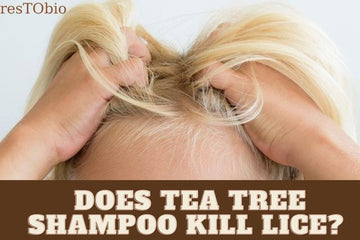
There is some debate over whether does tea tree oil kill lice. Some people say that it does, while others say it doesn't. This oil is a natural insecticide, so some people believe that it can effectively kill lice.
While tea tree oil may help to repel and kill lice, it is not a guaranteed solution for getting rid of a lice infestation. It is always recommended to consult with a healthcare professional or pharmacist for advice on the best treatment options for lice. They can provide you with safe and effective treatment options that are specifically designed to treat lice infestations.
What Are The Most Popular Uses Of Tea Tree Oil
The benefits of the oils are still being researched. According to what is currently known, the oil can be used as a natural lice treatment for some health conditions such as:
- Skin conditions such as acne, athlete's feet, and dandruff
- Head lice and scabies
- Cuts, burns, and bites
- Cough and congestion are common respiratory symptoms.

Tea tree oil can also be used in cosmetic products such as soaps, lotions, shampoos, etc. It can also be used as an ingredient in household cleaning products.
What Does Tea Tree Oil Do To Lice?
Tea tree oil is also known as melaleuca oil. It is an essential oil extracted from the leaves of the Australian tea tree (Melaleuca alternifolia). The oil can be found in various products, including shampoos, sprays, and drops. These oils are claimed to prevent and treat lice infestations. The American Academy of Pediatrics has not yet approved tea oil as a lice treatment.
Two significant tea oil components with insecticidal properties are 1,8-cineole (the main component) and terpinen-4–ol (the secondary constituent). Parasitology Research found that a one percent solution of tea tree oil could eliminate 100 percent of head lice in 30 minutes.
The study was done on lice and nits in laboratory dishes, so it may not work well in real life. Dr. Gandhi suggests that tea tree and lavender, both antibacterial, might also work.

Because of their ability to treat numerous ailments and promote health, essential oils have received much attention. She also mentions that essential oils can get rid of lice, including almond, sesame, olive oil, ylang-ylang, and Neem.
It is effective when combined with combing. However, caution should be taken. To rule out allergic reactions, you can test a tiny amount of essential oil before applying it to the skin. Is there no rash or itchy reactions? Your health is good. However, you should follow the guidelines. This includes diluting the oil to the correct concentration. If you experience allergic reactions, stop the lice treatment.
Lice reproduce quickly and can be killed with very few treatments. It is best to be patient and persistent. Apply a few drops of tea tree oil to the scalp and leave it for at least 24 hours. To get rid of dead lice, you can comb the hair the following day. The hair can be washed with tea tree oil shampoo and conditioner.
You should repeat the entire process two to three times per week, depending on how severe the infestation is, until you are rid of all lice.
How To Treat Licence With Tea Tree Oil
Step 1: Once you have made your tea oil mixture and chosen carrier oil, coat the head with it.
Step 2: Use a professional-grade nit comb to section your hair. Continue this process until you have removed all lice, eggs, and bugs. You must remove all nits from the hair to get rid of lice. This is the most crucial step to take. If you leave nits in your hair, it will encourage lice hatching.
Step 3: Add more of the mixture to your hair to ensure every strand is saturated. This mixture should be left on for at least 8 hours.
Step 4: Prepare a follow-up plan. It would help if you had a plan for re-treating or following up on eggs laid within the same day as treatment. When choosing lice treatments for your family, it is essential to consider all the needs of your household. This includes allergies and skin sensitivities. The oil can be used topically to treat head lice.
However, side effects such as burning, rash, and stinging may occur. It can cause nausea, headaches, vertigo, and nausea. For more effective and safer lice treatment, we recommend you follow the steps above but not the tea tree oil.
If you are still looking for the best shampoo and conditioner for your hair, read our article.
What Are The Known Side Effects Of Tea-Tree Oil?
Tree oil can have side effects depending on how it is used. It can be applied to the skin (topical application) or inhaled (aromatherapy).
Topical Applications Can Cause Side Effects
It applied to the skin can irritate significantly if it isn't diluted well or used in higher amounts. It can cause skin irritation.
- Redness
- Dry or scaly skin
- Itching
- Burning
- Stinging
Tea tree oil can cause allergic reactions in some people. This is known as allergic contact dermatitis. It can lead to a skin reaction that causes redness, swelling, itching, and blistering. These reactions are often caused by the oil that has been stored improperly or is old. However, fresh oil can also cause these skin reactions.
In 2007, a study showed that excessive breast growth was linked to regular tea oil and lavender oil in young boys. After he stopped using these products, the condition was resolved.

Inhalation Can Cause Side Effects
Aromatherapy can also use tea tree oil. This involves inhaling the oil through a diffuser or steam inhalation. Too much or too long exposure to oil can cause symptoms such as:
- Headache
- Nausea
- Vertigo
Side Effects of Internal Applications
It should not be used internally. Ingestion of tea tree can prove fatal and toxic. It can cause symptoms such as:
- Drowsiness
- There is confusion
- Uncoordinated movement (ataxia).
- Loss of consciousness
What About Pets And Children?
If swallowed, tea tree oil can be toxic. It is toxic if ingested.
Side Effects In Children
Children who ingested tea trees were reported to have suffered from poisoning in 1994 Trusted Source 1995 Trusted Source and 2003 Trusted Source. These children were treated at an emergency hospital and recovered.
Tea tree oil poisoning symptoms in children can be similar to adults. These symptoms can include:
- Feeling sleepy or tired
- Uncoordinated movement (ataxia).
- There is confusion
- Unresponsiveness or loss of consciousness
Side Effects In Pets
It applied topically to tea tree oil has also been linked to toxicities in pets.
One study, Trusted Source, examined incidents of cats and dogs being exposed to 100 percent tea oil over ten years. Researchers discovered that the oil was used in 89 percent of cases and not accidentally ingested by the animals.
Tea oil poisoning can lead to the following symptoms in cats and dogs:
- Increased drooling
- Extreme fatigue
- Muscle weakness
- Tremors
- Uncoordinated movement (ataxia).
Is There A Way To Make It Safer?
These products safety guidelines can help to reduce side effects. These are some tips:

- It should not be consumed or ingested.
- Tea tree oil should be kept out of reach from children and pets.
- Do not apply undiluted oil to your skin. The National Association for Holistic Aromatherapy (NAHA) states that oils used topically should always be diluted in carrier oils, creams, or lotions. Typically, this is between 1 and 5 percent.
- It should be diluted more if you have sensitive skin or use it on a child's skin. NAHA recommends a 0.5-2.5 percent dilution.
- You can test a small amount of it on your skin to see if it causes any skin reactions.
- You should ensure that your space is well ventilated if you intend to use tea oil as aromatherapy. Avoid prolonged exposure to tea oil fumes.
- The oil should be kept in the dark bottles, as light can cause damage.
When Should It Not Be Used?
It should not be used if you have eczema. It can make your condition worse. Inhaling tea tree oil can worsen asthma symptoms.

If you have any questions or concerns about tea tree oil, it is a good idea to consult your doctor. This is especially true if:
- Are pregnant
- Are breastfeeding
- Prescription medications
- Have an underlying condition
When Should You See A Doctor?
If you experience skin irritations or allergic contact dermatitis, stop using oil. If you experience severe skin reactions to tea tree oil or if it affects large areas of your body, consult your doctor.
If you or someone you know has swallowed tea oil or is suffering from anaphylaxis due to tea oil, seek emergency medical attention. Anaphylaxis symptoms include:
- Wheezing and coughing
- Swelling of the throat and face
- Trouble breathing or swallowing
- Anxiety or confusion
FAQs
Is Tea Tree Oil Good For Lice and Nits?
It has two components with insecticidal properties and has been proven to kill lice or nits.

Is Tea Tree Shampoo Effective Against Head Lice?
Some early studies have suggested that oil might effectively treat head lice. One study in Parasitology research indicates that it can kill lice at both the nymphal and adult stages. The number of lice eggs that hatch from tea oil treatments decreased.
Video
Conclusion
The safety of tea tree oil depends on who you ask. This is a mild essential oil with many benefits, but it is not suitable for everyone. If you want to use tea oil, do so at your own risk.
resTORbio hopes that you found this helpful article. You may also find our articles on herbs helpful. We have many articles on medical topics, so visit our site regularly to stay informed on the latest medical news.




